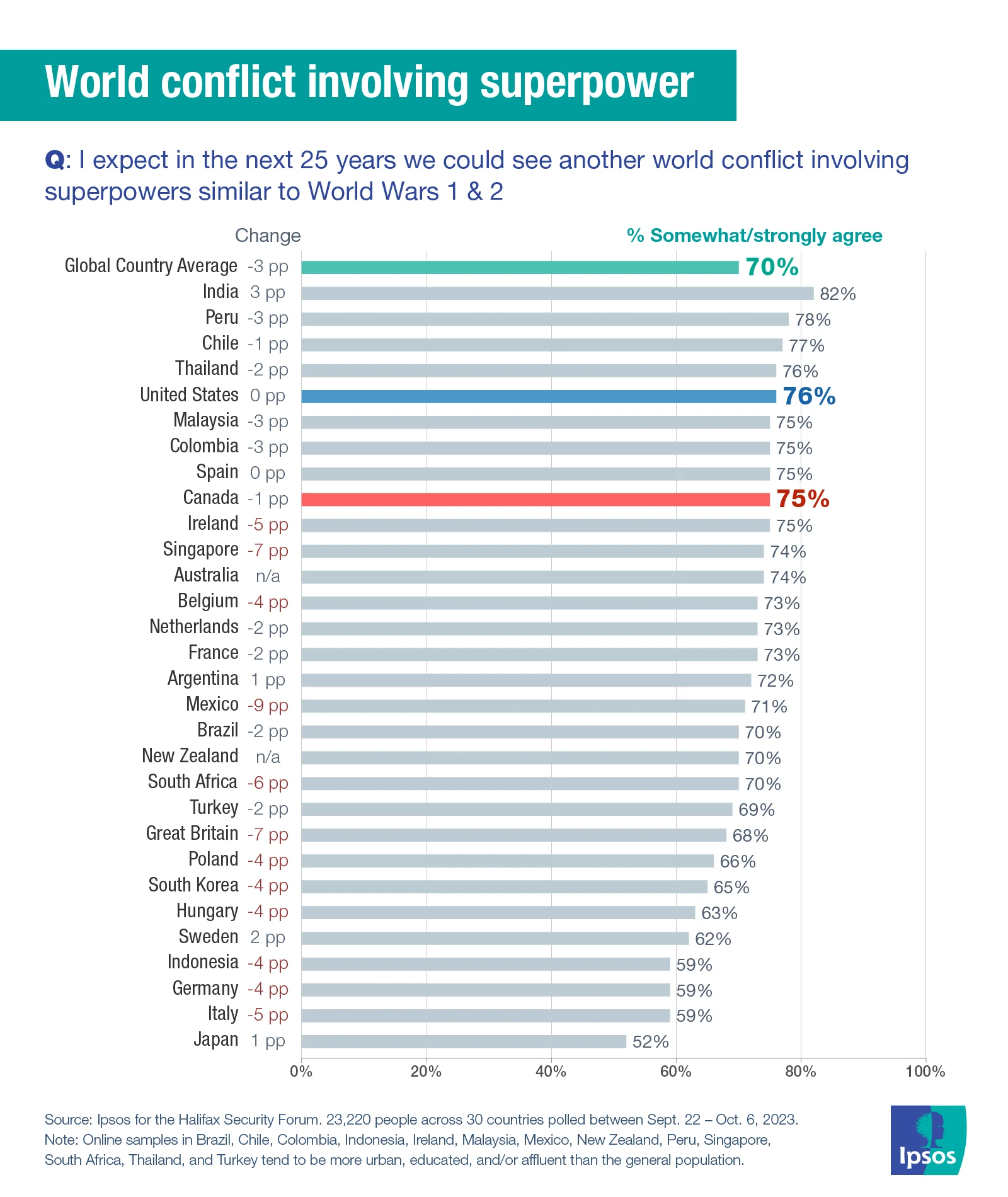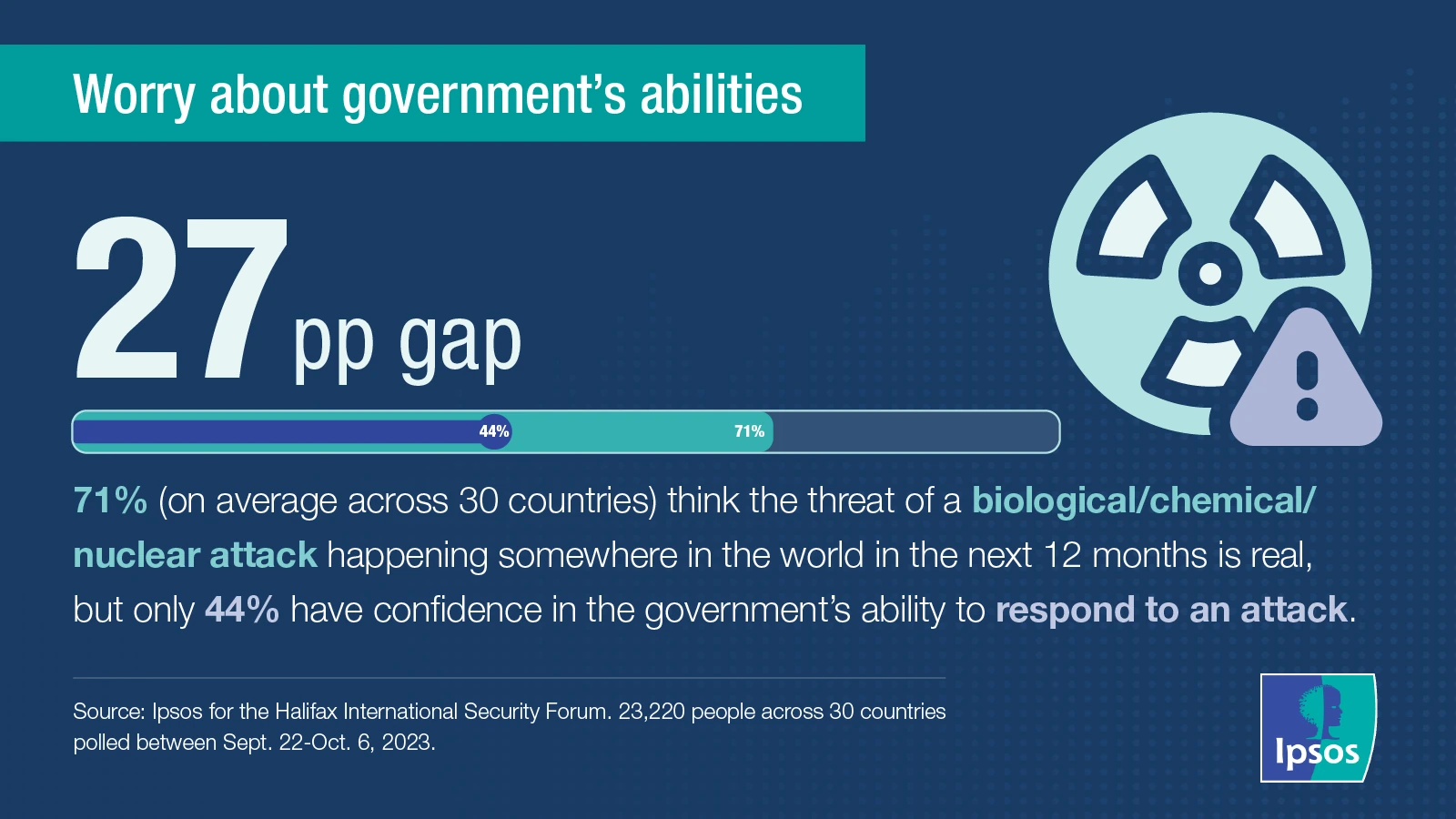Global citizens achieve near consensus: The world is becoming more dangerous
The world is feeling like a scary place these days.
New Ipsos polling conducted on behalf of the Halifax Security Forum across 30 countries from Sept. 22 and Oct. 6, 2023, (right before the Israel-Hamas war started on Oct. 7, 2023) finds the vast majority (-one percentage point to 84% on average globally) say that the world became a more dangerous over the past year.
With the invasion of Ukraine inching towards the two-year anniversary in February 2024, annual polling conducted on Ipsos’ Global Advisor online platform found the feeling that the world is more dangerous eased slightly in most countries over the past year after reaching a record high in 2022 of 85% but is still up significantly from 74% in 2018. The only country that saw a significant increase year-over-year in the feeling that the world is more dangerous is Turkey, up 10 points to 86%. The proportion of people in America who feel the world is more dangerous fell four pts to 84% and didn’t budge in Canada, remaining at 86%.
Majority expect there could be a worldwide conflict
The proportion that agrees that they expect in the next 25 years we could see another world conflict involving superpowers like World Wars I & II also eased slightly (-three pts to 70%). The only country to have a significant increase in the proportion of citizens predicting a world conflict in the next 25 years is India[1] (+three pts to 82%). Concern about a world conflict eased slightly among Canadians (-one pt to 75%) and stayed put among Americans (no change at 76%).

Nuclear attack worries cool a bit
The proportion saying the threat of a nuclear/biological/chemical attack happening somewhere in the world is real dropped four points to 71%, on average globally, in 2023 after surging nine percentage points in 2022 on the heels of the invasion of Ukraine.
On other issues people are feeling a bit less safe year-over-year. The perceived threat of terrorist attacks rose slightly (+two pts to 62%), as did personal safety/security violations (+2 pts to 63%) and ethnic conflicts in one’s own country (+1 pt to 60%).
Meanwhile, less than half have confidence in their government’s ability to respond to a terrorist attack (no change at 48%), violent conflict between ethnic groups (+one pt to 48%), armed conflict with another country (no change at 44%) or nuclear attack (no change at 44%).

Concerns about warring nations eases slightly
Almost half (-one pt to 49%) say the threat of their country entering an armed conflict with another country is real, with people in Thailand (no change at 79%), the U.S. (+three pts to 77%) and Turkey (-three pts to 74%) the most worried.
Just over six in ten (-five pts to 61%) believe war in Ukraine poses a significant threat to their own country. Concern is understandably highest in Poland, which borders Ukraine, but has dropped three percentage points to 81% in the past year. The proportion thinking the war in Ukraine poses a significant threat to their country dropped five points among Americans to 62% and 12 points to 50% among Canadians.
Almost seven in ten (-one pt to 69%) agree with the statement “I fear that in the next year or so China could take similar actions in Asia that Russia has taken in Ukraine.” While concern about a Chinese-led conflict in Asia dropped in most countries, the majority in all countries surveyed are worried it could happen, ranging from 57% (-nine pts) in Hungary to 82% (+six pts) in India. Similar proportions of people in America (-two pts to 75%) and Canada (+one pt to 76%) fear China could take similar actions in Asia that Russia took with Ukraine.
Table of content
- Canada, Germany most likely to be viewed as positive leaders on world stage
- Attack of the drones: six in ten perceive threat from ai-based defense systems
- HISF-Ipsos Threat Index finds natural disasters seen as fastest-growing threat
- Global citizens achieve near consensus: The world is becoming more dangerous
| Previous |
About this study
These are the results of a 30-country survey conducted by Ipsos on its Global Advisor online platform and, in India, on its IndiaBus platform, between Friday, September 22 and Friday, October 6, 2023. For this survey, Ipsos interviewed a total of 23,220 adults aged 18 years and older in India, 18-74 in Canada, Republic of Ireland, Malaysia, New Zealand, South Africa, Turkey, and the United States, 20-74 in Thailand, 21-74 in Indonesia and Singapore, and 16-74 in all other countries.
[1] Thanks to a change in methodology, the survey now captures the sentiment of a much broader swath of the Indian population. India’s sample now represents a large subset of its urban population — social economic classes A, B and C in metros and tier 1-3 town classes across all four zones.




